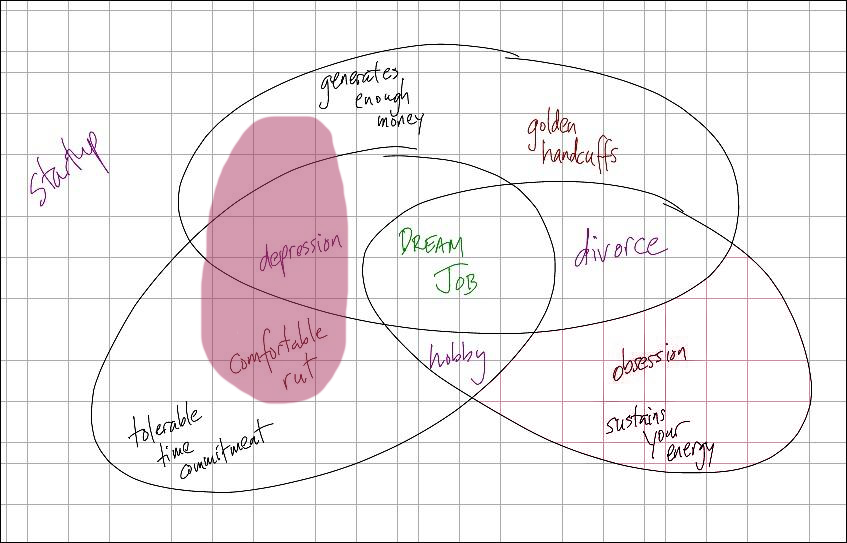You Can Start Enjoying Work More Today!
Do you have a miserable job? I judge by Patrick Lencioni’s definition from The Three Signs of a Miserable Job. How many decisions do you get to make about your work? How can you tell how well you’re performing? How do you see the influence and consequences of your work? If you face low autonomy, low measurability and low relevance, then you can safely label your job “miserable”. I think of these as jobs that don’t sustain your energy. They sound awfully miserable to me. My job at IBM was certainly miserable most of the time.

I have good news: if your job doesn’t sustain your energy, then you probably have hidden time slack, and if you do, then you can find ways to better sustain your energy at work. Remember: your capacity to do work starts with your energy. Don’t underestimate this fact. Without energy, you cannot work. No energy, no breathe; no breathe, no life.
Uh… What Time Slack?
I know you have time slack, because you told me you do. Well… you probably do. Does irrelevance figure in to what makes your job miserable? If so, then by definition you do some work that nobody cares about (even if someone claims very loudly in public, where everyone can see them, to care about it). Think about some of the tasks that you perform and ask yourself how other people use the results of those tasks. Sometimes you realise that nobody does. I remember at IBM writing documents that nobody read, drawing diagrams that nobody consulted, and even designing features that nobody used. Irrelevance… a real energy killer. You know the limit point of irrelevance at work as an existential break. I don’t recommend it. Let’s catch it before it happens.
Activate your time slack to start rebuilding your energy by allowing yourself to become engaged by something—anything at all—that you find interesting. This is not the same as cyberloafing. Lest you think that you’re cheating your employer, I offer another interpretation: your current low level of engagement is probably hurting your employer anyway, so it probably couldn’t become much worse.
If you start spending 30 minutes per day exploring something that you enjoy, then before long the raise in your overall energy will spill over into the rest of your work. You’ll probably find yourself gradually doing your “day job” more efficiently in order to make more time for your “fun work”. As long as you do enough to keep the salary flowing, I believe that you’ve fulfilled your obligation to your employer.
Warning: You Got It, But Don’t Flaunt It
Be careful, though: don’t do it too overtly. You probably have to cover up some, if not all, of your “fun work”. Although you understand that you’re benefiting both your employer and yourself, acknowledging that in public would almost certainly constitute political suicide, so don’t do it. Keep that to yourself.
If you reach a point where you just can’t hide the sheer volume of “fun work” you’re doing at the office, and you can’t spend any less time there, and you get your “day job” done too quickly, then you have a few options: negotiate for more responsibility (only if you’d enjoy it or it brings with it more pay), negotiate part-time work (only if you plan to invest the extra time in generating assets), negotiate working from home (perhaps you can hide your efficiency more easily) or use what you’ve learned to find a dreamier job (get more responsibility, a smaller time commitment, remote working privileges, or simply more money elsewhere).
Try This At Work
You can start soon. Maybe today. Find a day with room in your calendar where nobody is hounding you for the results of an uncompleted task. Set a timer for 30 minutes. Now do whatever the hell you want, as long as it’s something. Read an article or two. Hack around with some technology. Write. Anything. See what happens! More importantly, see how you feel when that timer goes off and you have to “get back to work”. Don’t worry: you’ll have another 30 minutes tomorrow.
References
Roland Paulsen, “The Art of Not Working at Work”. Stories of the struggle between the need for a physical presence at work and the lack of meaningful work to do.
Patrick Lencioni, Three Signs of a Miserable Job. Both cautionary and uplifting, this tells a story of people with a job that destroys their energy, and how to turn that situation around.
Jim Loehr and Tony Schwartz, The Power of Full Engagement. This book started me shifting my perspective away from managing my time (important) towards managing my energy (critical).
Tom DeMarco, Slack. I now see this book as a Trojan Horse: it claims to relate to enabling innovation, but it really encourages people to rescue their lives from a mental prison.


